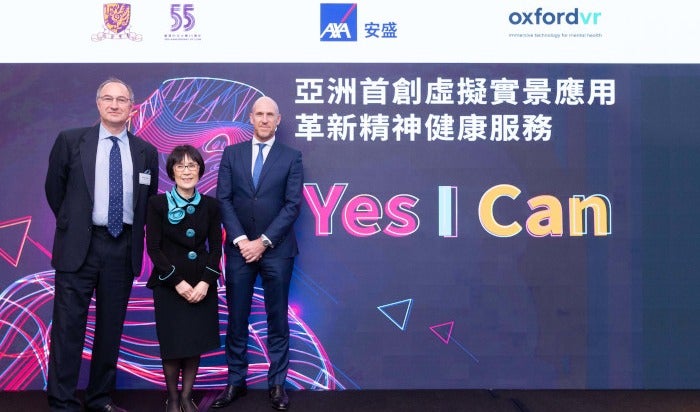
A new psychological therapy programme tackling social avoidance using virtual reality (VR) is being launched to support better mental health outcomes in Asia by Chinese University of Hong Kong and Oxford VR.
This collaboration, entitled “Yes I Can”, aims to help people feel safer and more confident in social situations, with the guidance of a virtual coach that assists the users through a series of tasks in environments that reflect everyday scenarios.
Barnaby Perks, CEO of Oxford VR, a spin-out of the university, said: “Based on its proven success in the UK, VR therapy can be used to treat most common psychological conditions, including common phobias, anxiety and depression and even more difficult conditions such as psychosis and schizophrenia.
“This is a solution whose time has come, and we are very excited to collaborate with AXA Hong Kong and CUHK to launch this social avoidance treatment programme.
“Technology holds the key to making high-quality mental health care more patient-centred and accessible.
“This strategic partnership with AXA Hong Kong and CUHK exemplifies our global leadership role in creating ground-breaking, clinically-validated, VR-enabled mental health solutions which have the capacity to bring unprecedented change to healthcare outcomes in the region.”

Mental health in Hong Kong
A recent survey conducted by YouGov in June 2019 revealed that 71% of the respondents have experienced at least one symptom of social avoidance due to anxiety and depression, such as the avoidance of social gatherings.
Behaviours such as difficulty in delivering presentations and talks at work, or avoiding social interaction with unfamiliar people due to anxiety or stress were also reported to be commonly experienced.
More than 60% of youngsters aged between 18 and 24 in particular have found inability to interact with strangers and unfamiliar people.
And 13% of people in Hong Kong reported feeling uneasy to discuss their mental well-being with anyone, as 36% among them fear that sharing their mental state could change how others perceive them, whereas 27% say they can’t afford the time or money to seek professional mental health services.
CEO of AXA Asia Gordon Watson said: “While there is a growing awareness of the importance of mental health, nearly two-third of respondents (68%) admitted that there is still a stigma associated with having a mental health condition preventing people talking about it and getting professional help.
“‘Yes I Can’ is about changing the status quo by offering high quality, innovative and clinically-validated mental health treatment to members of the public in need, and to our corporate customers as part of their employee benefits services.
“Through this initiative, we aim to make quality mental health care more accessible in Asia, with Hong Kong as a pioneer in breaking new ground.”
How the “Yes I can” programme works
The treatment requires a virtual coach that gradually and systematically guides the user through a series of tasks that reflect public environments such as a café, bus, street, doctor’s waiting room and convenience store.
Public scenarios enable the user to experience the same emotional and physical responses that triggers their anxiety and therefore their desire to avoid situations, as they would in a real-life situation.
The “Yes I Can” programme provides each participant with six to eight 30-minute VR sessions over a period of three to six weeks.
It is intended for use by adults who are aged 18 or above, and does not require a highly trained professional to operate the service.
The partnership under AXA Hong Kong, CUHK and Oxford VR also includes a clinical research study which involves the recruitment of more than 250 members of the public as participants.
“CUHK is committed to translating academic research into practical solutions, addressing societal needs and global challenges,” said professor Fanny Cheung, vice-president of CUHK.
“Mental health is definitely one of our key areas of concern.
“I am so delighted that AXA Hong Kong and Oxford VR share the same vision with us. I am confident this strong tripartite collaboration will pave the way for the delivery of an innovative, widely accessible, cost-effective and evidence-based mental health solution to Hong Kong and the wider world community.”






